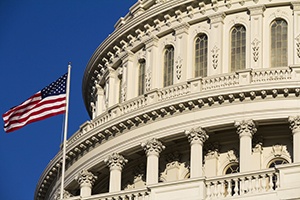 A longstanding demand of much of the political class has been for the government to stop interfering in the economy.
A longstanding demand of much of the political class has been for the government to stop interfering in the economy.
The latest example of this is a statement by incoming House Majority Leader Kevin McCarthy, in response to a question about the U.S. Export-Import Bank: “One of the biggest problems with government is they go and take hard-earned money so others do things the private sector can do.”
As you might guess, McCarthy says he won’t support reauthorizing the bank’s charter.
Do we really need the Ex-Im Bank?
The Ex-Im Bank is designed to help U.S. companies sell abroad by arranging financial and credit support, including loans. It’s used by corporations such as Boeing and Caterpillar, both major U.S. exporters. Many of its programs could be—and are—provided by private companies. But others couldn't be, and that’s where the agency adds value.
Every program or product a private company offers has to be profitable. There are exceptions, certainly, but to stay in business, a company must focus on its bottom line rather than the total return to society. A government agency like the Ex-Im Bank, on the other hand, can offer programs that are unprofitable but provide a greater social benefit—in the form of, say, aircraft manufacturing jobs.
Even when private companies offer such programs, the agency version might be cheaper; the absence of a profit motive could, perhaps, make a difference in supporting marginal deals. Ideally, the Ex-Im Bank creates more exports, and therefore more jobs and taxes, than it costs—again, by offering programs that wouldn’t be profitable for a private company.
What about Fannie and Freddie?
The Ex-Im Bank isn’t the only agency on legislators’ hit list, of course. Fannie Mae and Freddie Mac, the (originally) government-sponsored and now government-owned mortgage companies, are also prime candidates for dissolution.
Fannie and Freddie were set up to deal with the same sort of market failure as the Ex-Im Bank, by creating a central mortgage market to which lenders could sell their loans for cash—enabling them to make more loans. The benefits of the programs were wide, including broader availability of mortgage loans and the creation of the mortgage bond industry. Even since the financial crisis and rescue, the companies have returned substantial profits to the Treasury.
Would the private sector really pick up the slack?
In evaluating whether these programs make sense, it all boils down to whether the private sector will step in to provide the full range of services that the federal agencies do—and whether the costs of the agencies match up against their benefits.
Much of the talk about eliminating Fannie and Freddie has died down recently. It remains to be seen what will happen with the Ex-Im Bank, but both Boeing and Caterpillar have weighed in as strong supporters of the agency.
Either way, the problem with making decisions on an ideological basis is that you can end up ignoring very real costs and benefits on the other side. Hopefully, Congress will base its decisions on math rather than politics.


 Print
Print

